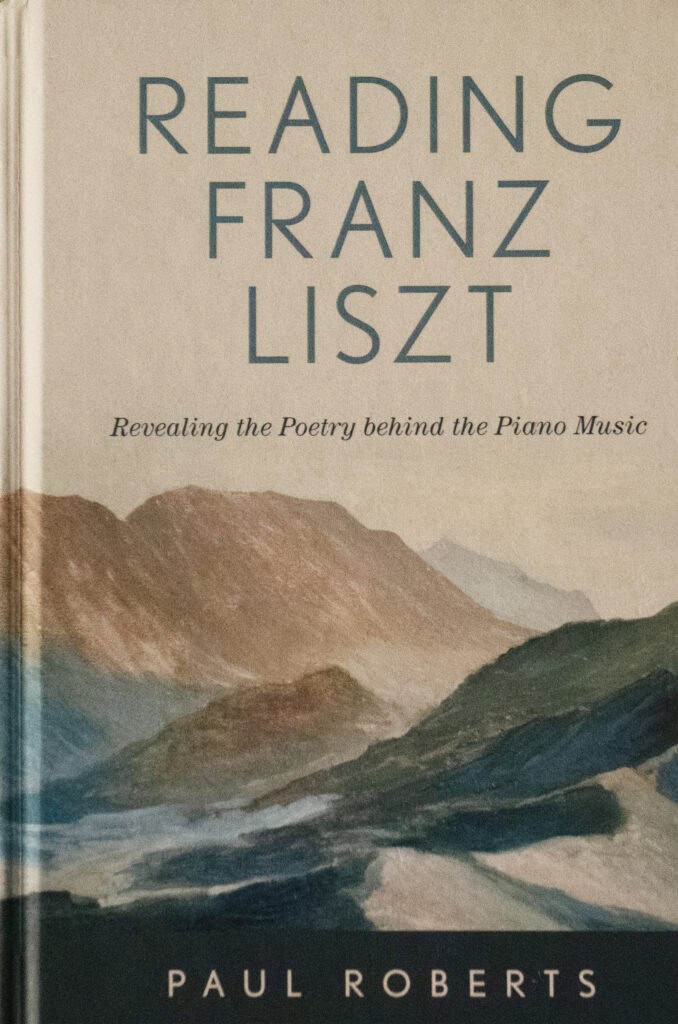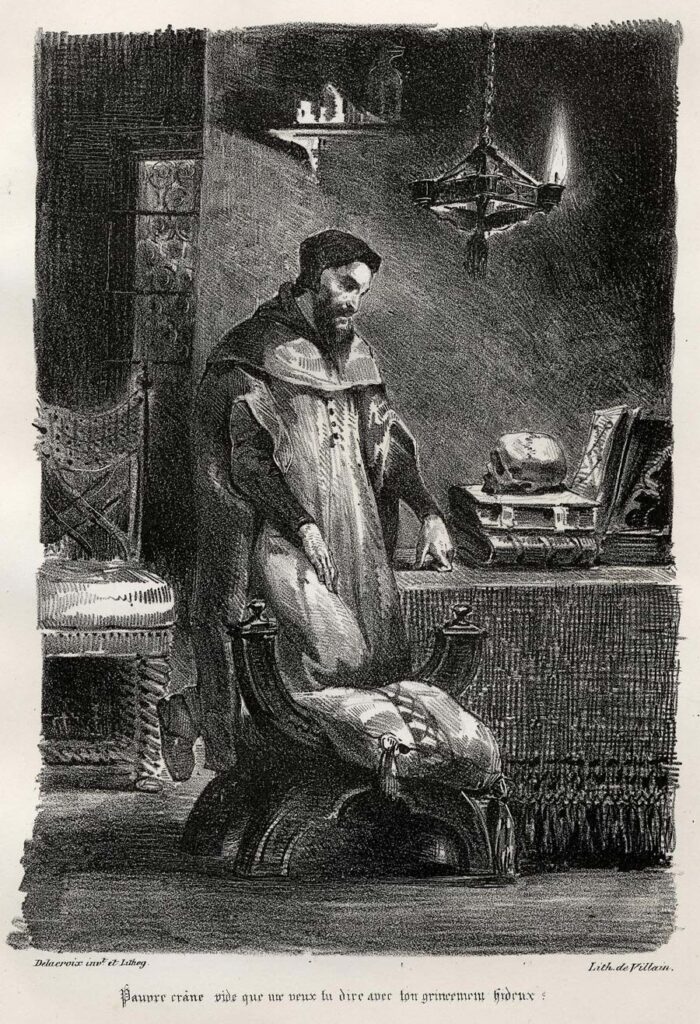Book: Reading Franz Liszt
Pianist Paul Roberts’ latest book “Reading Franz Liszt” invites readers into Liszt’s world through an engaging examination of his most cherished compositions and the underlying literary works that influenced them. Exploring the depths of Franz Liszt’s legacy, Roberts presents a fresh perspective on the legendary composer, emphasizing his poetic sensitivity alongside his technical prowess.
 Paul Roberts is widely recognized for his profound knowledge of 19th and 20th-century classical repertoire. What sets him apart is not only his extensive expertise but also his exceptional capability to convey complex musical concepts to both musicians and non-musicians alike. His ability to bridge the gap between technical intricacies and accessible understanding has garnered him considerable acclaim in the music community.
Paul Roberts is widely recognized for his profound knowledge of 19th and 20th-century classical repertoire. What sets him apart is not only his extensive expertise but also his exceptional capability to convey complex musical concepts to both musicians and non-musicians alike. His ability to bridge the gap between technical intricacies and accessible understanding has garnered him considerable acclaim in the music community.
Roberts’ book about Franz Liszt is organized into chapters that provide a comprehensive overview of the composer’s life and music. He begins with a historical background of Liszt’s upbringing, emphasizing the role of his father in the composer’s musical education and the social context of the time. Roberts discusses Liszt’s development as a composer and highlights his innovations in piano music and orchestration. The book delves into Liszt’s world through a vibrant exploration of his most significant works and the literature that inspired them – from Petrarch’s love poetry to the sensibility of Byron, Sénancour, Goethe, and others. The origin of artistic inspiration often appears unclear. But for Franz Liszt, literary quotes in his scores provide fascinating insights into the sources of his creative imagination and demonstrate a breadth of reading that inspired some of the most important piano works of all time. Roberts offers insightful explanations for Liszt’s use of thematic transformation, musical structure, and the composer’s unique approach to harmony.
 Roberts presents a broader perspective on Liszt’s life and time, highlighting the social and political context of the 19th century. The book discusses the challenges that Liszt faces as a musician and artist, including the competitiveness of the music industry and the expectations of his clients and surroundings.
Roberts presents a broader perspective on Liszt’s life and time, highlighting the social and political context of the 19th century. The book discusses the challenges that Liszt faces as a musician and artist, including the competitiveness of the music industry and the expectations of his clients and surroundings.
The author also explores Liszt’s relationships with other contemporary musicians, including Chopin, Wagner, and Brahms. Roberts reveals the complex dynamics of these relationships, highlighting both collaborations and rivalries. He also delves into Liszt’s romantic relationships, including his love affair with Marie d’Agoult and its impact on his personal life and music.
The book concludes with an evaluation and reflections on Liszt’s legacy and unique contributions to music history. Roberts argues that Liszt’s innovations in composition and performance made him one of the most significant figures of his time. This influence can be seen in the works of other composers, ranging from Debussy and Ravel to Stravinsky and Schoenberg.
Overall, “Reading Franz Liszt” is an engaging and insightful book that offers a comprehensive understanding of the composer’s life and music. Paul Roberts’ documented expertise in classical music and piano playing, as well as his ability to communicate complex musical concepts, make this book accessible and informative reading for both music enthusiasts and academics. It is an excellent resource for anyone seeking to deepen their understanding of one of the most important figures in the history of classical music.
Free Excerpt – The B Minor Sonata
We are happy to share a 7-page sample with our readers:
“Liszt’s Sonata in B minor – Goethe’s Faust and the Nature of Metaphor”
As an introduction to this excerpt Paul Roberts writes:
 One month before his 36th birthday, in late 1847, Liszt gave up his illustrious career as the world’s leading virtuoso pianist and within a few months was installed in Weimar as Kapellmeister to Grand Duke Carl Alexander. Here he became obsessed with the work of Germany’s greatest poet, Wolfgang von Goethe (1749-1832), and especially his monumental verse drama, Faust. The play tells the story of Faust’s tragic pact with the devil, Mephistopheles, who promises him endless and extravagant pleasure in exchange for his soul. One of the devil’s gifts is the beautiful peasant girl Gretchen. The tragedy that ensued, and the religious, moral and philosophical questions with which it engaged, had an enormous impact on artists – composers, writers, painters – of the nineteenth century and beyond.
One month before his 36th birthday, in late 1847, Liszt gave up his illustrious career as the world’s leading virtuoso pianist and within a few months was installed in Weimar as Kapellmeister to Grand Duke Carl Alexander. Here he became obsessed with the work of Germany’s greatest poet, Wolfgang von Goethe (1749-1832), and especially his monumental verse drama, Faust. The play tells the story of Faust’s tragic pact with the devil, Mephistopheles, who promises him endless and extravagant pleasure in exchange for his soul. One of the devil’s gifts is the beautiful peasant girl Gretchen. The tragedy that ensued, and the religious, moral and philosophical questions with which it engaged, had an enormous impact on artists – composers, writers, painters – of the nineteenth century and beyond.
In my book I wanted to examine the meaning of the Faust story for Liszt, and the complex web of associations in his mind when he was gestating, almost simultaneously, the B minor Sonata and the Faust Symphony. Sketches for both exist from the 1840s, and even an early version of the sonata from 1849, which Liszt played to his friends. But serious work on the B minor Sonata that we know today was not begun until 1852; the Faust Symphony was completed the following year.
The question is whether there is a plausible relationship between the Sonata and Goethe’s play? I devoted two chapters to this enquiry, the first principally about the play and its meaning, and the second focussing on the sonata itself. What is missing from the following excerpt is my discussion of the wonders of the play (Chapter 4, The Question of Goethe’s Faust), and a more detailed account of its possible application to Liszt’s music (Chapter 5, Music as Metaphor). For that, readers will need the whole context of the book. I say ‘possible’ application because the wellsprings of art are essentially unfathomable. The creative imagination does not respond readily to the rules of science, and talking about the meaning of music can only be speculative. In my Introduction to the book I addressed this question and I ended it with a quotation with which I will end here: “The construction of meaning is always a hypothesis, that is a well meaning guess.”
Paul Roberts has also published several books on music including ”Debussy: a Biography”, “Images: The Piano Music of Claude Debussy,” and “Reflections: The Piano Music of Maurice Ravel”.
Comments